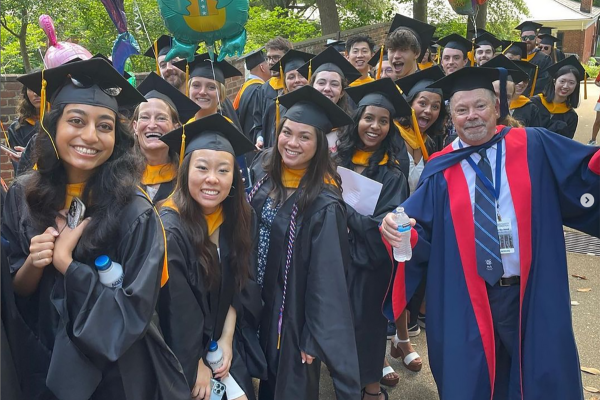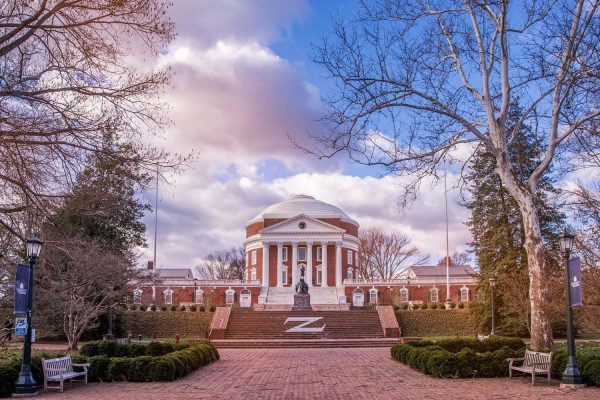
Alumni Perspective: Do I Need a Master’s Degree for Data Science?

In March 2021, after researching for quite some time, I decided to do a master’s in data science. A little over two years later, I received my M.S. in data science from the University of Virginia.
I hope to provide readers with some insight into the benefits (and drawbacks) of pursuing a master’s degree in the data science field.
I’ll break up my thoughts into three main sections: my experience and tips in deciding to do a master’s degree; my experience and tips in choosing a program; and, other reflections and notes.
My Experience Deciding to Go Back to School
This path is unique to every person, of course. It’s worth noting that most data scientists have at least a master’s degree, but it is not necessarily required. This is at least according to a few links I found Googling around but also matches my personal experience as all my data scientist colleagues at my current workplace have a master’s or a Ph.D. Regardless, I’ll walk you through my logic in making my own decision.
Money: This depends on the program you choose. But still, any graduate program will generally require a monetary sacrifice (at least for my U.S. friends). I was fortunate enough to attend a low-cost private institution (about $5,000 a year in tuition) for my undergrad. Working through school and with help from my parents, I graduated without debt. Because I didn’t have debt, I was more willing to spend money on a master’s degree a year after my undergrad. This, however, won’t be the case with everyone, especially if you aren’t interested in more debt or want more of a break from school.
Time Commitment: This also depends on the program you choose. Because I knew that I wouldn’t receive financial help from my parents for my master’s degree, I wanted the option to work full-time while attending school part-time to offset the cost. This was a trade-off as I had to sacrifice many nights and weekends over two years. With that being said, I also graduated without any debt because I was able to work full-time. Regardless of your program and how flexible it is, getting a master’s degree is a time commitment. You need to take set aside X time to take Y credits no matter how long you spread it out.
Field Value: How valuable will this be for my career if completed? I think this depends on each situation. For example, someone with an undergrad STEM degree may have an easier time breaking into data science than someone with a social science degree. Therefore, a master’s degree in data science would be more valuable for a person with a degree in a social science field than with a degree in a STEM field.
However, if you are already working as a data scientist, it probably doesn’t matter what degree you had in your undergrad at this point because experience generally is seen as more valuable than education when getting jobs.
Educational Value: I believe the act of learning is intrinsically valuable, and I think degrees help you learn. Certainly, you don’t need a degree to learn about a subject. But if you are a person who benefits from professors with answers and a structured curriculum, I think the learning opportunity from a degree is intrinsically valuable. If you are not that person, there are so many online courses and online resources for learning everything about data science. It is a field that can be learned through self-study. For me, I wanted more exposure to the field of data science in a structured, comprehensive curriculum, which I received!
Decision: At the time, I decided to go forward with a master’s because I had the time, the means, and a gap in my knowledge. I also believed that this degree would help my professional career, which it did. From the start to the end of the program, I went from data analyst to data scientist, and my salary doubled.
Tip: A master’s degree in data science is especially valuable to those who have never worked in data science before and do not have a STEM degree in undergrad. I found myself in this position, which made a master’s degree very valuable for me in my opinion.
My Experience Choosing a Program
I investigated and researched several different programs. Here are some of the things I looked for:
Focus: As you start looking into this, you’ll notice that there are broad programs and more focused ones. I would say that typically a master’s degree is considered broader than a Ph.D., which is designed to hone in on one very specific piece in a field. But even among master’s degrees you see more broad ones: M.S. in data science (this was my program) or analytics or information and then you have M.S. in data analytics and public policy or M.S. in computer vision or M.S. in quantitative social science.
Generally, you can expect the broad ones to cover a wider range of topics and the other ones to take a stronger focus on one part of data science. But, the reality of data science is… it’s a super broad field with applications in most other fields. There are natural language processing data scientists, biology data scientists, public health data scientists, political data scientists, robotics data scientists, marketing data scientists, sports data scientists, and on and on.
While subject knowledge is important in each of these applications of data science, often the methods are more similar than different. If you are convinced that you will only be in one corner of data science, perhaps it would be better to do a focused one, but for me, I was interested in exploring the field more so than choosing a corner.
Cost: Price varies significantly from $10,000 total to more than $100,000. My program ended up costing $40,000, but my salary more than doubled from the start to the end of the program, and the salary differential fully covered the cost of the program and more!
Technical Prerequisites: Different programs are geared toward different crowds. Some will have no or very few prerequisites. Personally, these programs worried me because I assumed that programs with few prerequisites would not cover topics in the technical depth I desired. I didn’t want a bunch of classes just covering things I already learned in my undergrad. I wanted to learn after all!
My specific program had four prerequisites at the time: calculus I & II, linear algebra, and programming in Python. I had already taken calculus in school but ended up taking community classes for linear algebra and programming in Python.
Technical Depth of Program: For those committed to a degree, I highly encourage you to look through the required courses in the program. Often, you can also find summaries and even syllabi for the classes in the program. A lot of programs that did not have prerequisites also did not seem to have technical depth in classes. What drew me to my program was there were classes on all the topics I was interested in (deep learning, Bayesian machine learning, NLP, and also more engineering components such as Spark/big data and data structures and algorithms).
Looking back at my program, I am pleased with the courses I took. I learned so much in most of them and was exposed to so many interesting things from computer vision to NLP to CS search algorithms that I had no idea about with my political science background.
Decision: I decided on UVA because I was satisfied with the technical depth of the program, and the cost was not more than I could handle in my position at the time. It offered the flexibility I was looking for and opportunities for connections among classmates and professors. I also appreciated how broad the courses were — covering many facets of data science throughout the program.
Reflections and Notes
Tip 1: Of everything, I wish I paid more attention to program outcomes. Answering questions like, where do the alumni work? Does my program feed into specific companies? This is a HUGE advantage of certain programs. For example, UVA feeds into Capital One and has strong contacts and connections there for graduates. If you are interested in working at Capital One, my program would be a great choice!
If I were to do everything over again, I’m not sure I would change anything. But, if I did, I would apply to certain programs that have strong big tech connections such as the University of California, Berkeley; the University of Washington; and several other California schools. I may have considered Georgia Tech’s program, which has a strong reputation, and the tuition is about $10,000.
Tip 2: My program was fully online. In truth, it was one of the best online programs I could hope for. My cohort was about 30 students that I stuck with throughout the program. There were numerous group projects and assignments, and I got to know the students in my cohort. With the relatively small class sizes, I also felt like I got to know several of my professors.
Having said all of this, I felt like I had a better experience and developed better connections during undergrad, which was in person. For these reasons, if I were to do it again, I would try to find an in-person program. This may not be possible for everyone — some may want to work or are unable to relocate — but I do think in-person provides a richer academic experience.
Tip 3: It can be helpful to just search around on LinkedIn and see the paths that current data scientists took to get where they are. Often, they do not have a master’s degree in data science but have a degree in physics, computer science, or some other STEM field. In my opinion, most STEM degrees are seen as generally equally viable in data science job candidates. So, if you are more interested in studying another STEM topic but want to work in data science, go study that topic and you can still get a job in data science.
Learn more about Alex, his data science journey, and his projects on his blog.



